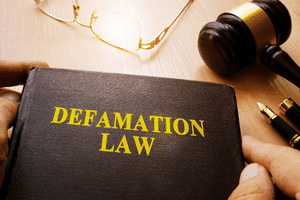Cyber libel, defamation, and slander are on the rise. This is largely due to two factors: 1) individuals are emboldened by the ease at which they can post content with fake information, and 2) the growing number of social media users. Statista predicted that the number of users across all social media platforms will reach 4.89 billion by the end of 2023. In this article, we’ll take a look at these three—cyber libel, defamation, and slander, and everything you need to know about them.
What Is the Difference Between Cyber Defamation, Libel, and Slander?
People usually confuse the terms cyber libel, slander, and defamation.
- Defamation refers to any false statement that causes damage to a person’s reputation. Libel and Slander, on the other hand, are both types of defamation.
- Libel is a false statement in written form that destroys a person’s reputation. This could be a blog comment, an article published on the media, a post published on social networks, or an online review.
- Slander is a false statement spoken orally that defames a person’s character. This could be an interview, podcast, or speech on TV.
For example, if someone says or writes “Joe is a thief. He stole money at his former workplace” on their social platform or any other publicly accessible medium and this statement is untrue, it is defamation. This is because your statement damages Joe’s character in the eyes of others and this might cause him to lose jobs or deals. Therefore, Joe can decide to file a defamation lawsuit.
Opinion and Free Speech
The law protects opinion statements against defamation lawsuits. But sometimes, things can be tricky when people use “opinions and free speech” as obvious means to defame others. However, “I think Joe did something wrong at his former workplace ” and “I think Joe stole something at his former workplace” are two opinion statements, but their effects are not equal.
The latter can potentially damage the reputation of Joe in the eyes of anyone who hears or reads about it. If the statement is untrue, it’s defamation. This is the line between freedom of speech and libel. So, it’s important that opinions are passed on with caution. Saying or writing untrue statements to defame people and coating them with “I think” doesn’t prevent those who shared their opinion from facing potential defamation liability.
Public Figures vs. Private Figures
The law believes the reputation of private figures is more deserving of legal protection than public figures. Public figures are household names, and generally, good and bad publicity accompanies them. More so, they can counter defamatory statements by organizing appearances on talk shows and interviews. However, this isn’t something private figures can do easily. Therefore, a private figure is more likely to win a cyber libel case than a public figure.
Can an Online Review Become Libel?
People can publish defamatory statements against individuals or businesses. As a result, spreading false claims about someone, even through something as simple as a review, can result in a defamation case. This keeps reviewers and others in check and prevents the spread of lies. For example, this story is about a woman who landed in court on grounds of defamation for giving a bad review on Yelp.
How Do You Prove Cyber Libel?
To prove cyber libel, here are the things you’ll need before you file a lawsuit.
- The defamatory statement: This is a prerequisite to filing a lawsuit in some areas. Ensure that you have evidence of the false statement.
- Collect web links to defamatory posts or comments.
- Take screenshots of it when possible to preserve evidence and prevent spoliation.
- Witness: Find someone, if possible (a third person) who witnessed the defamatory statement go live if it could not be preserved.
- Damages: Save evidence on the financial, reputational, and mental damage the statement has had on you.
- Negligence/Malice: Gather proof that the person who defamed you published a lie out of negligence or malice. For public figures, you have to prove that the publisher knew the truth or didn’t care about whether the statement was true or not, but published it anyway.
In most cases, especially for private figures, proving the truth is what you need to win a libel lawsuit. Regardless of how bad the commentary a publisher gives is, it’s not defamation if it’s true. Therefore, you can’t file a lawsuit. If a victim wins in a defamation case, they may be reimbursed with a sum of money to compensate them for the damage that their finances, reputation, and health have suffered. Read here to learn more about the steps you can take to make sure your social media evidence is admissible in court.
Can You Sue for Libel on Social Media?
Suing for cyber liber involves obtaining clarity on certain things before you invest your energy, money, and time into filing a lawsuit. Who is the person responsible for your defamation on social media? You have to pinpoint someone who has a name, and whose address and phone number you can ascertain. This does not include the internet service provider (ISP). The Communications Decency Act protects ISPs from any defamation claims. So, you can’t sue Twitter, Instagram, or sites like Yelp and Capterra.
Also, keep in mind fake social media accounts can use incorrect information – or other people’s identities – to inflict cyber libel, so it’s important to make sure you actually know who is actually behind the account. If you know the true identity of the bad actor, you can sue for cyber libel, you should find a lawyer to take up your case and provide legal advice. When filing your lawsuit, make sure you are aware of and adhere to local rules regarding jurisdiction for the state and/or federal court system.
Here is professional guidance on how to track down a fake social media account and how to stop online harassment, as well as some helpful online harassment resources we have collected.
Conclusion
You don’t have to (and shouldn’t) let slander, defamation, or cyber libel slide. It has the negative potential to severely affect several parts of a victim’s life—financial, mental, and reputation. These days, more and more defamation cases are going to court. In consideration of this, online reviews and commentaries should be made with caution.
Are you looking for help in dealing with cyber libel? Reach out to learn more about how the professionals at Bosco Legal Services can assist you.






